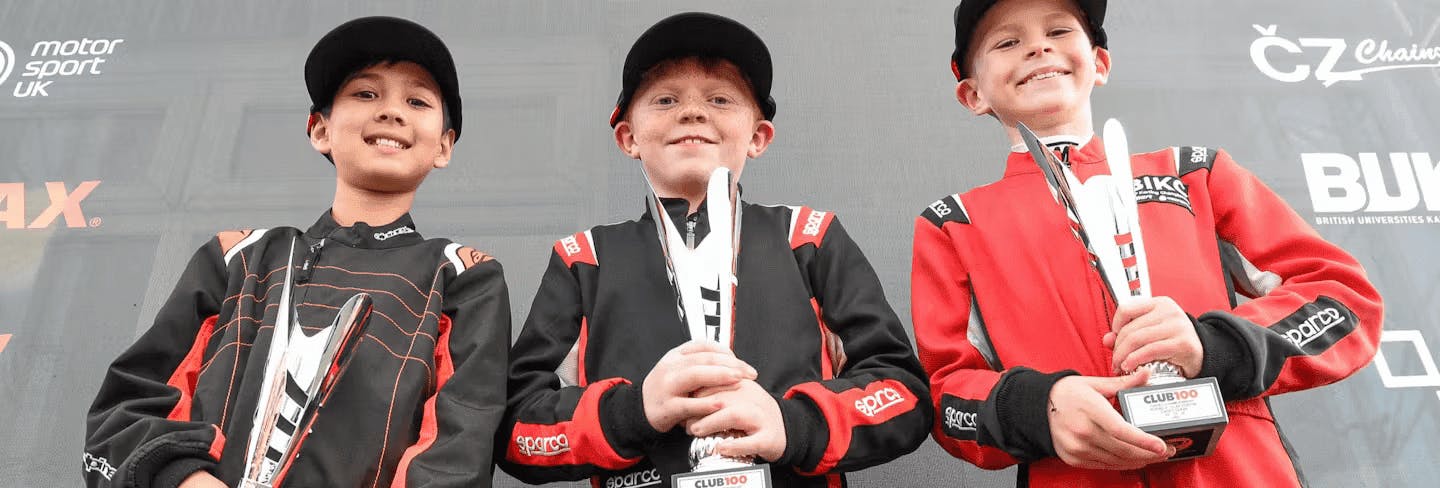
Indoor karting is a thrilling sport that caters to both casual hobbyists and competitive racers alike. Many professional F1 drivers - such as Lando Norris and Max Verstappen - started their racing careers with competitive go-karting.
With its easy accessibility and adrenaline-pumping action, it's no wonder that indoor karting has gained immense popularity across the UK. But how do you go from getting into racing, to occasionally racing (and treating it as a casual hobby), all the way to competitive racing? What are the key differences and the associated costs?
Indoor karting is an awesome way to begin your journey into racing. Enthusiasts of all ages can experience the thrill of racing with our go-karts and e-karting (anyone under 8 years old must spectate only).
For hobbyists, it's a chance to enjoy friendly competition with friends and family in a safe environment. Plus, indoor tracks usually have different ways to race – timed sessions, Grand Prix-style events, even endurance races – so there's something for everyone, no matter your skill level.
As you get better and better, you might start thinking about taking things up a notch - that's where competitive karting comes in. Competitive karting involves participating in organised racing leagues, championships, and tournaments, where drivers compete for the podium. It's a step up in terms of commitment and skill, but the feeling of accomplishment? Worth it.
The Difference Between Hobbyist And Competitive Karting
While both hobbyist and competitive karting share the same fundamental principles of racing, there are notable differences between the two:
1. Skill Level
Competitive karting demands a higher level of skill and proficiency compared to casual hobbyist racing. Competitive racers often undergo extensive training and practice sessions to learn advanced karting techniques and improve their lap times.
2. Equipment and Setup
In competitive karting, racers typically invest in high-performance karts and specialised racing gear tailored to their specific needs and preferences. Hobbyists, on the other hand, may opt for rental karts provided by the facility, which are designed for recreational use.
3. Commitment and Focus
Competitive karting requires a greater degree of commitment and focus, with racers dedicating significant time and resources to training, preparation, and participation in races and events.
As well as on the track dedication moving into the competitive world of karting requires lifestyle changes off the track. Check out our guide to Go Kart Food and Nutrition to get started.
Transitioning from Hobbyist to Competitive Go-Kart
Transitioning from a hobbyist to a competitive go-kart racer involves a strategic approach and dedication, here are our tips for moving into the competitive world of racing.
Start by participating in club races to gain experience and sharpen your skills. These events provide opportunities to learn from more seasoned racers and familiarise yourself with the competitive environment.
- Practise regularly and consistently to refine your driving technique. Spend time on the track, both during organised races and in private practice sessions, to hone your abilities and become comfortable handling the kart independently.
- Seek guidance from experienced drivers or coaches who can offer valuable insights and help you improve your performance. We recommend getting a racing coach to help you refine your technique, but speaking with established racers and being a part of the competitive community is also very valuable for growth.
- Stay committed to your training regimen and continually strive for improvement to make a successful transition from amateur to competitive go-kart racer.
- Be prepared to make sacrifices - making the shift from hobbyist to competitor in any sport requires an incredible amount of dedication - both financially and with your time.
With this being said, the level of dedication will be reflective of how many competitions you wish to do and at what level. Someone wanting to do a single, local race per year, will be spending a significantly less amount of money and time when it comes to training and travelling. This is compared to someone who wants to move into a more ‘professional’ racing role - possibly starting off go-karting before moving into other forms of competitive racing.
For more information on the cost of professional go-karting, please read on.

The Cost of Karting: Hobbyist vs Competitive
Go-karting costs can vary significantly depending on the level of involvement and commitment.
Hobbyist go-karting is an accessible and affordable way for enthusiasts to experience the thrill of racing without breaking the bank. However, competitive karting requires a higher level of financial investment due to the increased focus on performance, equipment, and participation in organised racing events.
So, how much does go-karting cost for a hobbyist vs a competitor? These are the facts to consider:
Hobbyist Karting costs
Track Fees
Indoor karting facilities usually charge a flat rate or per-session fee for access to the track. This fee covers the use of the track facilities, the go kart itself, safety equipment, and briefing sessions.
Safety Gear & Accessory Rental
Helmets, gloves, and race suits are essential safety gear required for karting. Hobbyists who don't own their gear can usually rent it from the facility for a small fee.
Learn more about TeamSport's optional extras and other terms and conditions before arrival.
Adult Karting starts at £45 per session and Junior Karting (13-15 years) starts at £25.50 per session - this may increase, depending on the venue, location, and level of amenities provided - more information is covered in our blog post How Much Is Go-Karting?
Competitive Karting
Thinking about getting into kart racing? Here are some things to consider when it comes to costs:
Buying (and maintaining) your kart
Thinking of going competitive? Many competitive karters will choose to invest in their own go-karts, which can range from entry-level models to high-performance racing machines.
Please remember, prices can vary based on brand, specs, and any extras. Don't forget about maintenance costs - keeping your kart in top shape isn't free!
Entry Fees
Ready to hit the track? Well, you'll need to pay up. Entry fees can change depending on where you're racing, how big the event is, and how many races you're signing up for. They usually cover administrative bits, like paperwork, track rental, and use of the facilities.
Travel Expenses
Racing events won’t always be on your doorstep - competing in karting championships or series, often involves travel to different tracks and venues. That can create additional expenses such as fuel, accommodation, meals, and transportation of equipment (even if you’re happy to lug it around for the most part!)
Coaching and Training
If you want to up your game, you may need to consider investing in racing coaches and training programs. Hiring professional coaches, attending racing schools, or participating in simulator training sessions can add to the overall cost of competitive karting.
Equipment Costs
Safety First! In addition to purchasing a kart, competitive racers need to invest in high-quality safety gear, including helmets, suits, gloves, shoes, and other accessories. These items are essential for ensuring driver safety and compliance with racing regulations.
Sponsorship and Funding
Some competitive kart racers seek sponsorship deals or funding support from sponsors, manufacturers, or private investors to offset the costs of participation. Securing sponsorship can help cover expenses such as equipment purchases, travel costs, and entry fees, but it often requires a proactive approach and a strong marketing presence.
Whether you're a hobbyist karting enthusiast or a dedicated competitive racer, karting offers an exhilarating and adrenaline-fueled experience that's worth every penny. By understanding the costs associated with karting and planning your budget accordingly, you can enjoy the thrill of the track while staying within your financial means. So, whether you're racing for fun or chasing podium finishes, buckle up, rev your engines, and embark on an unforgettable karting journey!
Potential salary
In the realm of karting, the potential for earning a salary varies depending on factors such as sponsorship deals, prize money, and professional opportunities.
While top-tier professional go-kart racer salaries may be substantial due to sponsorships, endorsements, and competitive winnings, it's essential to recognise that karting is primarily a passion-driven sport for many enthusiasts.
At TeamSport, we have partnered with Motorsport UK to run our own British Indoor Karting Championship (BIKC), including fantastic prizes for winners that have included access to other karting competitions like Club100 and Global Karting League.
Are you ready to Level Up?
From weekend warriors to podium contenders, the world of karting welcomes enthusiasts from all walks of life to unleash their inner racer and embrace the thrill of the track. If you’re keen to embark on a journey into competitive racing, check out our competitions blog, or head down to your nearest TeamSport today!